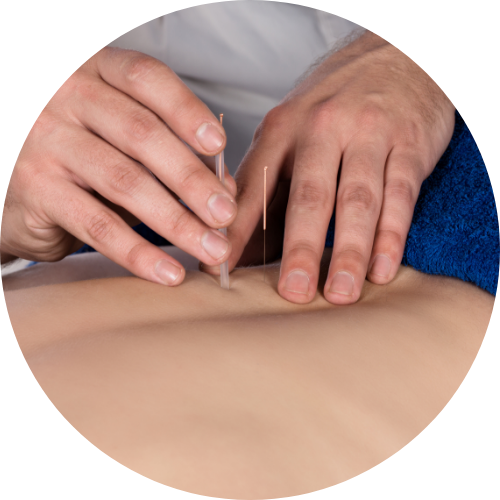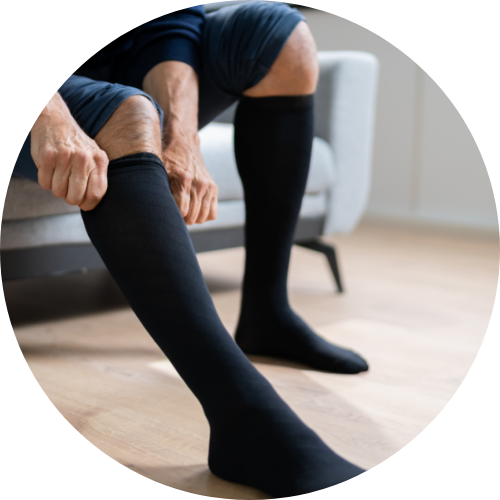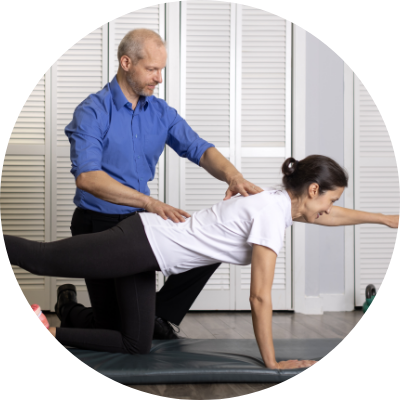Medical Acupuncture
Acupuncture is a therapeutic intervention involving the insertion of fine needles into specific points in the body.
Many health care practitioners use acupuncture in their clinical practice, including chiropractors, physiotherapists, and medical doctors. Not surprisingly then, there has been a clear trend of the integration of acupuncture into a Western medical model. Coupling ancient concepts of Chinese medicine with modern biomedical concepts, Western health care practitioners of many disciplines are now incorporating acupuncture treatment both as stand-alone therapy, and as an adjunctive, complementary treatment modality to other conservative treatment techniques.
 Dr Mueller trained in Contemporary Medical Acupuncture (CMA) at McMaster University. This training is only made available to health care professionals such as Chiropractors, Medical Doctors, Physiotherapists, and Naturopaths. Acupuncture is a powerful adjunctive treatment as utilized by health care professionals to treat conditions of the neuromusculoskeletal system. Some people may refer to this approach as “dry needling”.
Dr Mueller trained in Contemporary Medical Acupuncture (CMA) at McMaster University. This training is only made available to health care professionals such as Chiropractors, Medical Doctors, Physiotherapists, and Naturopaths. Acupuncture is a powerful adjunctive treatment as utilized by health care professionals to treat conditions of the neuromusculoskeletal system. Some people may refer to this approach as “dry needling”.
CMA is performed by fine, sterile needles inserted into points selected for their use in the Traditional Chinese Medical (TCM) model, as well as points chosen relative to their anatomical locations. Many TCM models have which have been demonstrated to have powerful physiological effects are also rationalized in the CMA model due to their anatomical relationship to peripheral nerves, blood vessels, muscle, tendon, capsule and other tissues with a high number of autonomic, sensory and motor nerve fibers. Responses to treatment include but are not limited to increase in local blood flow, relaxation of local muscles, deactivation of trigger points and it is a potent pain reliever. CMA often introduces electrical simulation through the needles which can be a powerful addition to needle insertion alone.

FAQ
What is acupuncture?
Acupuncture is a therapeutic intervention involving the insertion of fine needles into specific points in the body. Combining thousands of years of anecdotal evidence with modern biomedical research, acupuncture has proven to be a valuable therapy in the treatment of many conditions, both acute and chronic.
What is “medical acupuncture”?
Medical acupuncture is a biomedical approach to acupuncture that combines traditional acupuncture and acupuncture theory with modern, biomedical knowledge, practiced by Western-trained health practitioners (e.g. chiropractors, physicians, physiotherapists). Coupling traditional Chinese acupuncture methods, with our current concepts in neuroanatomy, neurophysiology, and pathophysiology, allows Western practitioners to better organize clinical information to generate safe and more efficient treatments for their patients using acupuncture as a sole therapy, or in combination with other therapies. With medical acupuncture, healthcare practitioners take a proper, thorough history, and perform a physical and neurological examination to arrive at a diagnosis. Selection of relevant acupuncture needling sites follows. It is sometimes referred to as “dry needling”.
What conditions are commonly treated with acupuncture?
Medical acupuncture may be used in the treatment of many acute and chronic injuries and conditions. Common problems that are responsive to acupuncture include:
- Acute sprains and strains
- Pain from nerve entrapment (e.g. sciatica, carpal tunnel syndrome)
- Repetitive strain disorders (e.g. tennis elbow, plantar fasciitis, Achilles tendonitis)
- Myofascial pain patterns (e.g. temporo-mandibular joint pain, muscle tension headaches, shoulder pain, neck and back pain)
- Joint pains (arthralgias) particularly osteoarthritic in nature
- Degenerative disc disease with or without radicular pain, pain following surgical intervention (both musculoskeletal and visceral)
- Postherpetic neuralgia
- Peripheral neuropathic pain
What are the benefits of acupuncture?
The benefits of acupuncture have been widely studied. The main benefits can be summarized as follows:
- Control of pain (analgesic)
- Anti-inflammation
- Healing and regeneration
- Normalization of autonomic nervous system
Is acupuncture safe?
In the hands of a properly trained and qualified acupuncture practitioner, acupuncture is one of the safest therapeutic interventions in existence. Acupuncture has a time-tested record of millions of treatments with extremely few significant side-effects. Nowadays, the use of sterilized, single-use, disposable needles has eliminated any risk of infections from needles.
Does acupuncture hurt?
In the vast majority of patients, acupuncture does not cause any significant discomfort. The needles are very fine, and do not cause any damage to tissues when inserted. A minority of patients may experience momentary discomfort upon needle insertion, drowsiness, or localized bruising. For many people, acupuncture is considered to be a pleasant, relaxing experience, enhanced by the known therapeutic effects that follow treatment. Dr Mueller often performs electroacupuncture where a gentle electrical current passes through the needles to accentuate the therapeutic interaction. Many patients find the sensation so comfortable that they sleep through the majority of their treatment.
Additional services available

Chiropractic

Compression Stockings

Custom Orthotics

